Whether you’re new here or have been reading the newsletter since the very beginning, you’ve probably wondered, at some point or another, why I named it Half-Caste Woman. It’s not exactly the most polite term, is it? When you google the word “half-caste,” the definition and a stern warning—⚠ OFFENSIVE—are the first results:
Had I asked anyone what they thought of me using a low-key racial slur to name my newsletter, I’m sure they would have told me not to do it. But of course, I didn’t ask anyone. I figured it was my word to use as I liked because, you see, I am a half-caste, or at least in another era, that’s what people would have called me. And if the word makes you uncomfortable, that’s part of the point.
Of course, I’m not advocating for people to call me or any other mixed race person a “half-caste.” Many Americans don’t even know what the term means anymore, but that doesn’t stop them from using it. In the UK, the phrase is apparently alive and well. So when I call myself a half-caste, I do so with a wink. I use the word because it holds no power over me, it doesn’t make me feel less than or half of something but never whole. At the same time, I want others to remember the way society once ostracized and condemned people like me.
Anna May Wong also understood the subversive power of a wink. Which is why she embraced Noel Coward’s 1931 song “Half-Caste Woman” as if it were her own. She performed the number countless times on her cabaret tour across Europe from 1933 to 1934.

As I write in Not Your China Doll, the song “glorifies the tragic beauty of a Eurasian woman who is prevented from leading a normal life because of her mixed racial background. Instead, she works as a prostitute in a port city, drinking with the sailors who pay her for sex.” The story of the “tragic Eurasian,” borrowed from the more American version of the “tragic mulatto,” became a popular trope in the 1930s. The underlying assumption of these tales was that the Eurasian was doomed to a liminal existence, never fully accepted by either side of her heritage, and good for only one thing: to be enjoyed and gawked at for her exotic, forbidden splendor.
The chorus of “Half-Caste Woman” makes this quite clear:
Half-caste woman, living a life apart
Where did your story begin?
Half-caste woman, have you a secret heart
Waiting for someone to win?Were you born of some queer magic
In your shimmering gown?
Is there something strange and tragic
Deep, deep down?Half-caste woman, what are your slanting eyes
Waiting and hoping to see?
Scanning the far horizon
Wondering what the end will be
It’s not hard to see why Anna May found a certain kinship with this tragic figure. Many of the characters she played in her films, from Lotus Blossom in The Toll of the Sea to Shosho in Piccadilly and Song in UFA’s film of the same name, were exoticized as the other and ultimately punished for their racial transgressions—falling in love with a white man.
I argue in my book that Anna May “undeniably saw herself as a half-caste of sorts. Everywhere she went, society found a reason to exclude or censure her. She was Chinese and American but never enough of either to be fully accepted.” So when she sang the lyrics to this song, I wonder if “her enthralled listeners stopped to muse whether the words were meant in jest or if they revealed the depths of an untold suffering.”
I have listened to a version of “Half-Caste Woman” sung by Noel Coward himself many times. Despite knowing full well what the lyrics say, the song never fails to bring tears to my eyes. I cry for the woman who could have been me in another life.
And then I remember that the vision of a mixed race person as a tragic figure is merely an idea projected onto us. There’s no truth to it. Sure, life was likely more difficult in a world that did not look kindly upon mixed race people. But tragic? Buying into that judgment simply reinforces the original assumption: that interracial love is bad and racial mixing is morally wrong.
Anna May herself fell prey to this misconception. In private, she told friend Frank Dorn that she had declined a British man’s marriage proposal because she did not want to bring “half-breed” children into the world. She made similar admissions publicly, too. Reporters were always asking her whether she had plans to marry, and if so, who would she marry, a Chinese man or white man? In a 1937 interview that appeared in the Salt Lake Tribune, Anna May explained that she felt she “ought to marry a Chinese for the sake of the children and all that.”
Though it hurts me to hear these words from Anna May, I understand her perspective. The life she led as a full-blooded Chinese American woman, who was often treated like a half-caste, was hard enough. She trusted in her own strength to navigate the challenges of the path she had chosen for herself, but she couldn’t condone making that decision for another living being, much less her own child who did not ask to be brought into an inhospitable world.
Ironically, AMW’s life and career, like the tragic Eurasian, have routinely been cast in a tragic light. I have resisted that narrative in my biography in favor of a framework that emphasizes the agency she had all along. Just as I do not see my life as tragic because I happen to be mixed race, I do not believe that AMW thought of her own life in similar terms. Otherwise, why bother? Why devote your career to changing the way Asians are represented on-screen if you think you’re doomed to fail?
The next time you open an issue of Half-Caste Woman, I hope the name gives you pause—and causes you, for just a moment, to think about what it means for me and Anna May Wong and many others to defy the labels that others use to define us.
HERSTORY
March is Women’s History Month, which means it’s the perfect time to honor Anna May Wong’s legacy as a badass woman. While you’re waiting for Not Your China Doll to hit bookshelves in a few days’ time, enjoy this excellent short documentary on AMW from the Unladylike2020 series, made by the creators at American Masters. Think of it as the amuse bouche to my full-length biography!
IN THE NEWS
Last night I read an excerpt from Not Your China Doll at Books & Burlesque’s Spring Awakening show, after which my words were translated into performance by burlesque artist Fortune Cookie. It was a helluva way to kick off my first event for the book!
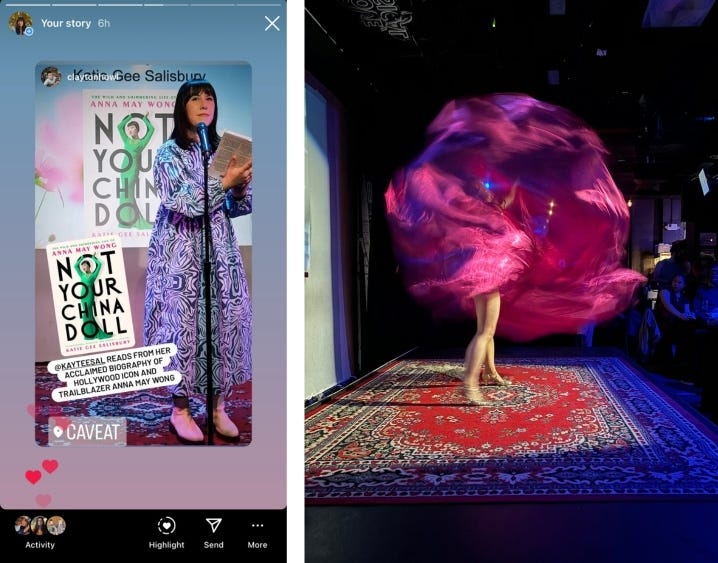
To my utter shock and awe, people are already buzzing about the book! Anne Helen Petersen calls it “really fucking good” in this interview on her Substack Culture Study.
And Library Journal recently gave the book a starred review, stating: “This compelling account of Anna May Wong’s life and career as a film star is hard to put down. . . . Salisbury is a skilled storyteller, seamlessly interweaving historical context, behind-the-scenes Hollywood anecdotes, and forthright takes on the social milieu of the time. . . . A thoroughly researched and superbly written study of a remarkable woman.”
For those of you who want a sneak peek, American Masters ran an excerpt from the book about the moment Anna May Wong knew she’d be a star.
Plus, I had a blast sitting down with friend and fellow biographer, Susan Blumberg-Kason, to chat about the book and Anna May Wong’s friendship with Bernardine Szold Fritz for World Literature Today.
You can also catch me in conversation with Jonathan Ytreberg on The Oscar Project podcast.
UPCOMING EVENTS
March 12 - NYC Book Launch
Red Pavilion, 1241 Flushing Ave, Brooklyn, NY
Buy tickets
March 14 - In conversation with Ed Park
The Strand Bookstore, 828 Broadway, 3rd Floor, Rare Book Room, New York, NY
Buy tickets
March 14 - In conversation with Mayukh Sen + Screening of Daughter of Shanghai
Metrograph, 7 Ludlow St, New York, NY
Buy tickets (use code AMW40 at checkout for 40% off the annual membership)
March 18 - In conversation with Lisa Ling
Zibby’s Bookshop, 1113 Montana Ave, Santa Monica, CA
SOLD OUT
March 19 - In conversation with Nancy Wang Yuen at the Chinese American Museum of Los Angeles
The Historic Pico House, 424 N. Main Street, Los Angeles, CA
Reserve a spot
March 20 - In conversation with Jeff Yang
Vroman’s, 695 E Colorado Blvd, Pasadena, CA
Open to the public
March 25 - Screening of Piccadilly + Book Signing
Roxie Theater, 3125 16th Street, San Francisco, CA
Buy tickets
March 28 - Book Talk at Book Passage
Book Passage, San Francisco, 1 Ferry Building, San Francisco, CA
Open to the public
April 18 - In conversation with Graham Hodges & Yunte Huang
MOCA, 215 Centre Street, New York, NY 10013
Reserve a spot
May 17 - Writing Asian & Asian American Biography
BIO International Annual Conference
Leon Levy Center for Biography, CUNY, 365 Fifth Avenue, New York, NY 10016
Buy tickets





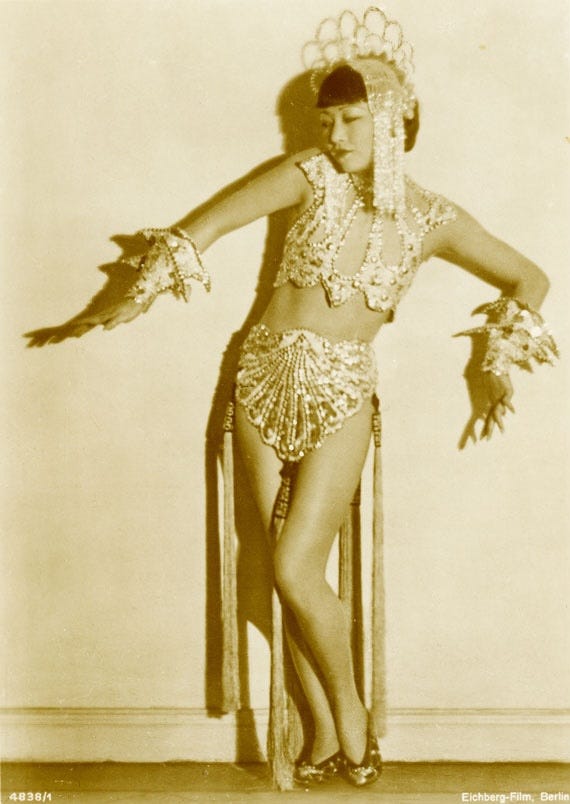
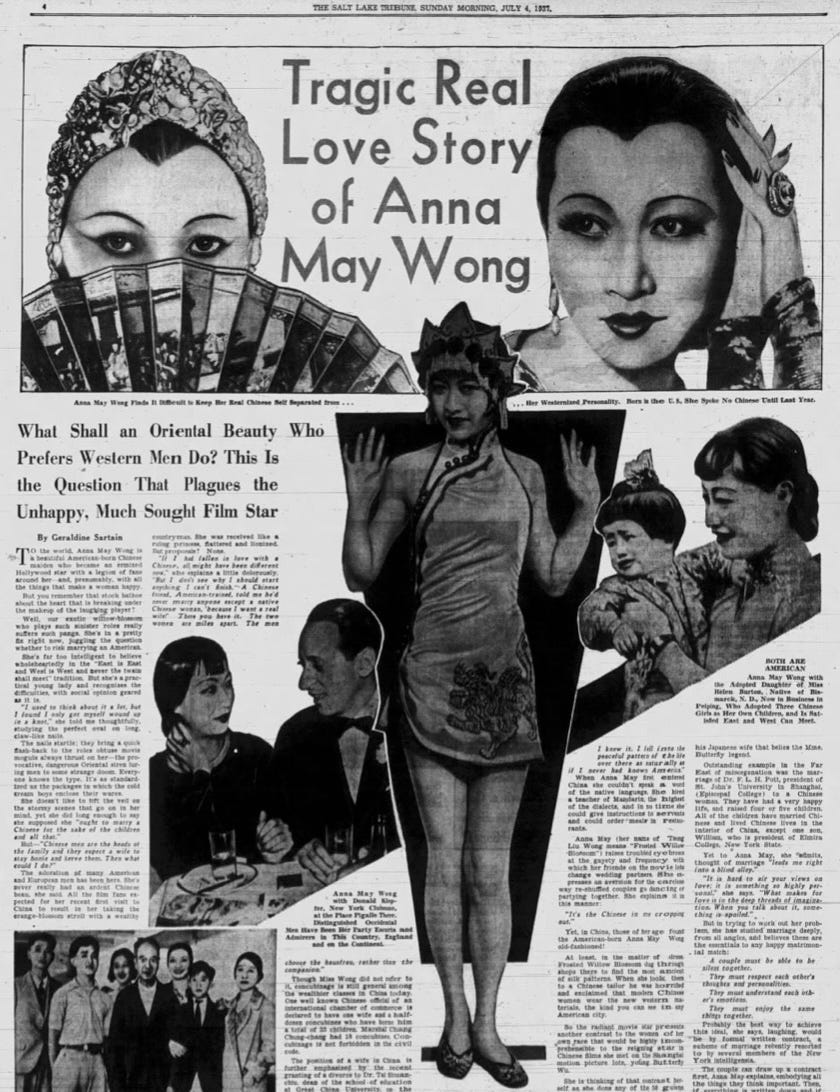
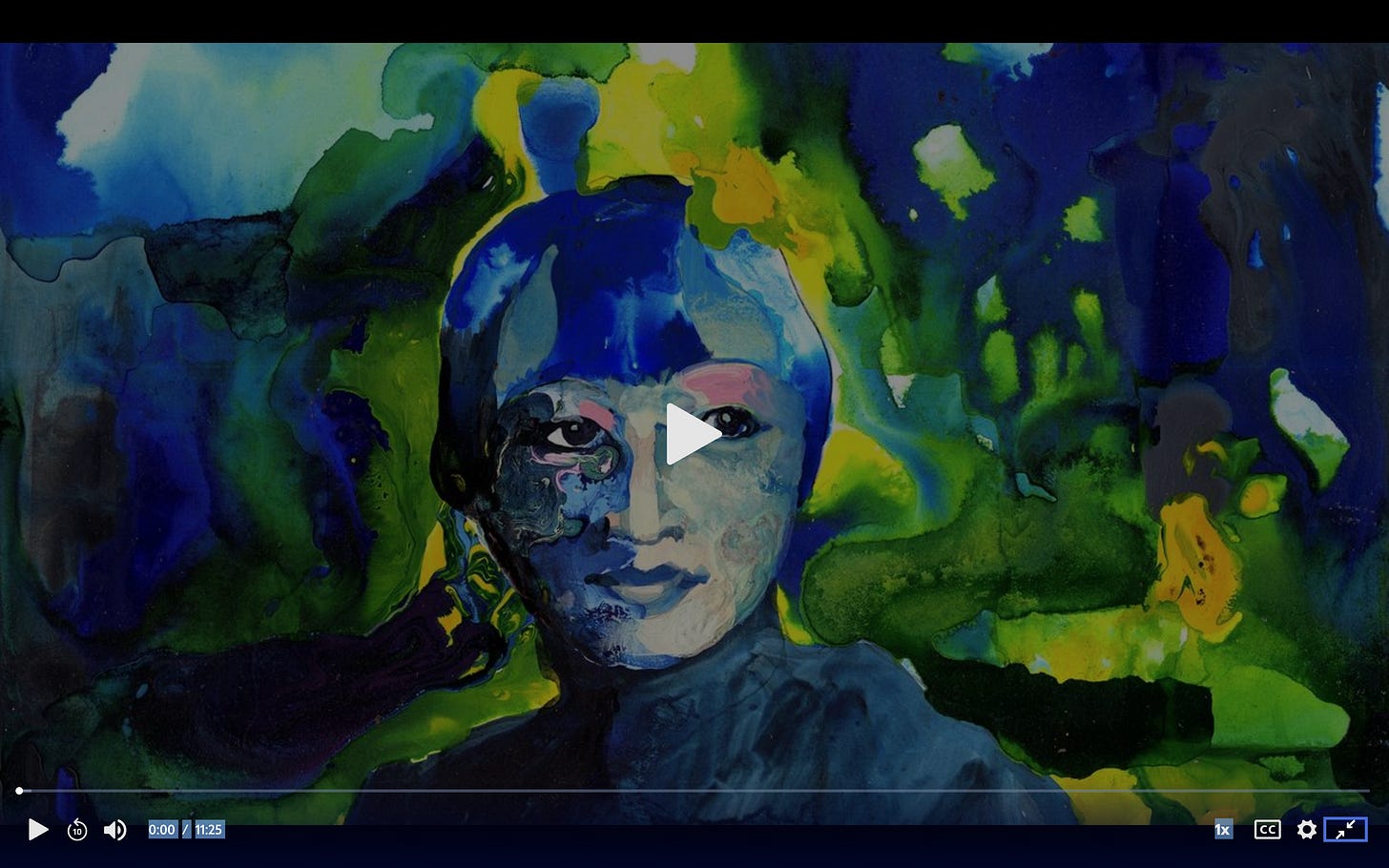

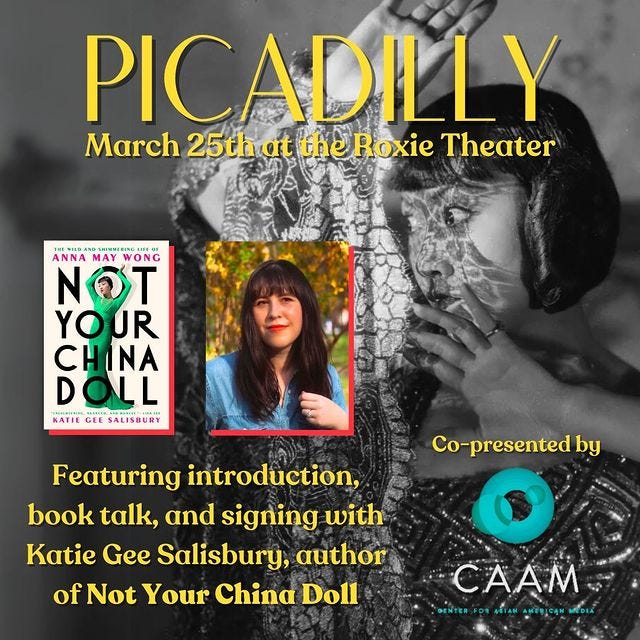
After reading the current addition I am so anxious to receive your book this week! I so hope the film of AMW is a truthful and honest one. She was a gifted woman on so many levels and the world needs to know this story. Likewise they need to read your book and keep up with your column. I am so glad you are there and thanks for being you!
Katie, this is such a wonderful essay on “half-caste” and many other matters. And Library Journal! Fantastic review - they don’t hand those out to just any book, as I well know!
Congratulations!